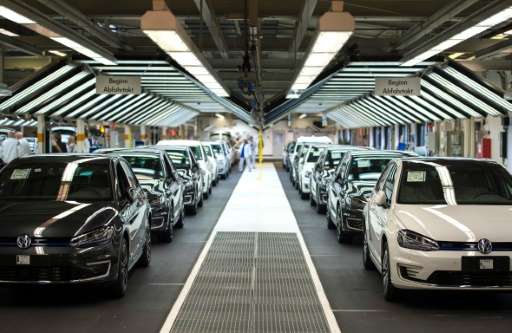Employees of German car maker Volkswagen check cars at a assembly line of the VW plant in Wolfsburg, central Germany, on October 21, 2015
EU lawmakers on Monday firmly rejected plans by the European Commission to allow diesel car makers to continue to exceed pollution limits.
The Commission had said in October that from 2020 manufacturers would still be allowed to produce vehicles exceeding EU limits on harmful nitrogen oxide emissions by 50 percent, even though German auto giant Volkswagen rigged its results to get past regulators.
The European Parliament's Environment Committee on Monday approved by 40 votes to nine a motion saying the proposals by the Commission, the EU's executive arm, were incompatible with existing EU emissions standards and it should come up with new ones.
Liberal MEP Gerben-Jan Gerbrandy, who helped draft the motion, said "the proposed exemptions agreed by EU governments are a disgrace."
"The cheaters are rewarded, while the carmakers that respect the emission rules shoulder the costs," Gerbranday said in a statement.
"EU ministers must make their position public and should be forced to explain their decision to undermine car emission standards," he said.
The Commission had announced the new limits as the VW scandal raged, alongside plans for more realistic pollution monitoring based on real road conditions, not laboratory tests.
It said what is known as a Real Driving Emission (RDE) regime meant Europe was now at the forefront of pollution reduction efforts, being "the first and only region in the world to mandate these robust testing methods."
Europe's auto industry, which employs 12 million people, says that meeting the new standards will still require time.
Under the Commission's proposals, from September 2017 new diesel models would be allowed to overshoot the EU's official nitrogen oxide limit by 110 percent.
From 2020, the discrepancy would be brought down but only to 50 percent.
The full EU parliament is expected to vote on the Commission proposals in January.
© 2015 AFP
























